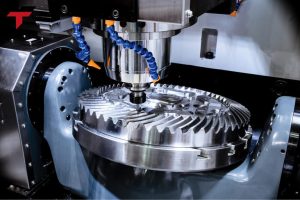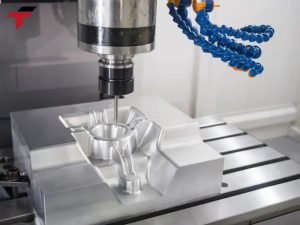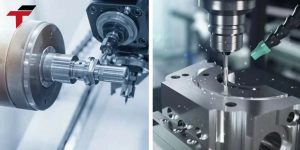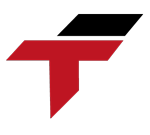When your business decides to invest in CNC machines, choosing the right equipment can determine the productivity and quality of your products. But how do you choose the right CNC machine for your specific production needs? In this article, we will share important factors to consider before purchasing a CNC machine, helping you make smart decisions, save costs and improve production efficiency.
Introduction to CNC Machines
CNC machines, which stands for “Computer Numerical Control,” are one of the most advanced technologies used in modern manufacturing. CNC Machines allow for the automation of machining processes of materials such as metals, plastics, wood, and other special materials.
The importance of CNC machines is demonstrated in ensuring high precision, optimizing production processes, and reducing working time. They are widely used in many industries such as the automotive, aerospace, and medical industries, contributing significantly to the creation of high-quality products.
How many types of CNC Machines are there?
CNC machines are classified based on function and application, suitable for different production needs. Below are the common types of CNC machines:
CNC Lathe
CNC lathes are used to process cylindrical or conical objects, such as shafts, pipes, and bolts. With the ability to rotate and cut accurately, this type of machine is often used in the automotive and precision engineering industries.
CNC Milling Machine
CNC milling machines are versatile devices that can process flat surfaces, grooves, or holes on materials. With flexible moving axes, milling machines are suitable for jobs that require high detail, such as mold manufacturing and electronic components.
CNC Plasma/Laser Cutting Machine
This type of machine uses plasma or laser to cut materials, especially effective with thick metals such as steel and aluminum. This is an indispensable tool in the construction and heavy metal processing industries.
Electrical Discharge Machine
EDM machines use the principle of electrical discharge to machine hard materials, such as stainless steel or titanium alloys. They are ideal for products that require extremely high precision.
5 Axis CNC Machine
These machines are designed to machine complex products, such as engine blades or aerospace parts. With the ability to rotate and tilt the cutter, 5 axis CNC machines offer outstanding flexibility.

Classification of CNC Machines
What are the benefits of CNC machines?
CNC machines are not just a processing tool, CNC machines are the foundation to help businesses improve their competitiveness and achieve sustainable development. So, what are the specific benefits that CNC machines bring? Let’s explore together.C
- High precision: CNC machines process parts with extremely high precision, often at the micrometer level, which is superior to manual machining. The ability to repeat identical products with consistent precision ensures consistent quality in mass production.
- Improved production productity: The ability to operate continuously 24/7 and reduce setup times helps optimize productivity and production efficiency.
- Cost savings: Using CNC machines reduces labor costs, reduces material waste due to high precision, and reduces maintenance and repair costs due to stable machine operation. Overall, CNC machines significantly reduce production costs.
- High integration: CNC machines are easily integrated into automated production lines, helping to optimize the production process and reduce human intervention.
- High flexibility: CNC machines can process a variety of materials from metals, plastics, and wood to composite materials. The ability to create complex shapes and easily change machining program designs helps meet diverse and flexible production needs.
What are the precautions when using CNC machines?
When using CNC (Computer Numerical Control) machines, there are some important precautions to ensure efficiency and safety:
- Ensure safety: Before operating the machine, always wear personal protective equipment such as safety glasses, gloves and non-slip shoes. Check and ensure the work area is clean and free of obstacles.
- Check the software and code: Before starting, make sure that the G-code and CNC commands have been programmed correctly. Errors in the code can lead to damage or defects in the product.
- Choose the right cutting tool: Choose the right type and size of cutting tool suitable for the material and processing requirements to ensure efficiency and accuracy.
- Monitor the operation: During the entire machining process, monitor the machine to promptly detect any problems such as abnormal noise, vibration or high temperature.
- Periodic maintenance: Perform periodic maintenance and inspection of CNC machine parts to ensure stable and long-term machine operation.

Notes when using CNC machines
What should you pay attention to when buying CNC machines?
When buying CNC machines for your business, you need to pay attention to the following factors to ensure that the machine is suitable for your needs and helps optimize the production process:
- Suitable CNC machine type: Choose the type of CNC machine based on the production requirements of the business because each type of machine has different applications, so it is necessary to clearly define the production goals.
- Size and processing capacity: Make sure the machine has the right size and processing range for the products that the business will produce. You need to consider the machine’s ability to process large, small, or complex parts.
- Features and technology: Modern CNC machines often have high automation features, flexible programming capabilities, automatic cooling and cleaning systems, or IoT connectivity for remote monitoring and supervision of the machine. Choose a machine with features that suit your production needs.
- Cost and budget: Consider the initial investment cost of the CNC machine, operating costs (including energy consumption, maintenance, and spare parts), and costs incurred over the life of the machine.
What are the applications of CNC Machines in industry?
CNC machines play an important role in many industrial fields
- Automotive industry: Machining parts such as pistons, crankshafts, and gears, ensuring high durability and precision.
- Aerospace: Manufacturing aircraft parts that can withstand high temperatures and pressures, such as engine housings or fan blades.
- Healthcare: Machining medical devices, such as implants or surgical instruments, that meet strict safety standards.
- Electronics: Manufacturing micro-components, such as circuit boards and chips, that require high precision in every small detail.
- Construction: Machining steel structures or concrete molds, helping to speed up construction.

CNC machines are used in a variety of industrial fields
Conclusion
CNC machines are not only a machining tool but also a symbol of innovation in the manufacturing industry. With the continuous advancement of technology, CNC Machines will continue to play an important role in improving efficiency and product quality to meet the increasing demands of the global market.
